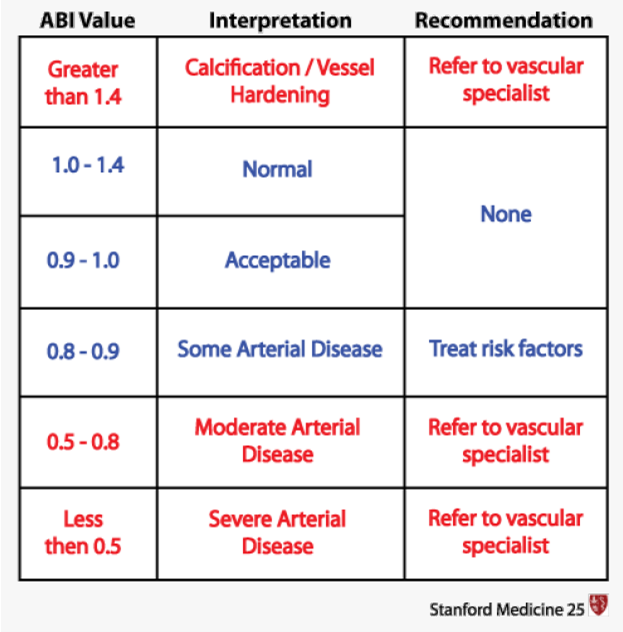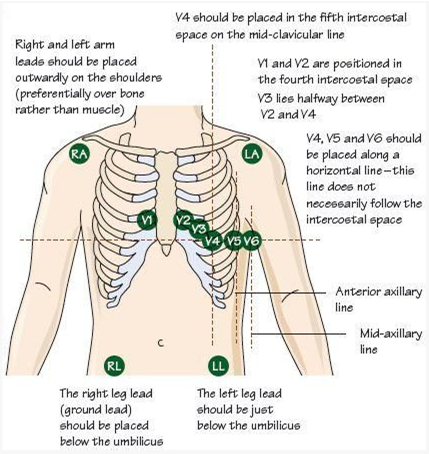The nurse is assessing a client with a presumptive diagnosis of peripheral arterial disease. The nurse obtains an Ankle-Brachial index of 0.89. Which intervention should the nurse take next?
Document the information as a normal finding
Prepare the client for an arterial bypass
Educate the client about the use of compression stocking
Anticipate a prescription for clopidogrel and simvastatin
The Correct Answer is D
An ABI of 0.89 indicates a reduced blood flow to the lower extremities, which is suggestive of peripheral arterial disease (PAD). In PAD, there is narrowing or blockage of the arteries that supply blood to the legs and feet. Medications like clopidogrel and simvastatin are commonly prescribed for individuals with PAD to manage the condition and reduce the risk of complications.

Here's an explanation of why the other options are not the most appropriate interventions:
Document the information as a normal finding: An ABI of 0.89 is not considered a normal finding. An ABI value below 0.9 is generally indicative of PAD or reduced blood flow to the lower extremities.
Prepare the client for an arterial bypass: An ABI value of 0.89 alone does not warrant immediate preparation for an arterial bypass. Arterial bypass surgery is typically considered for severe cases of PAD with significant symptoms that significantly impact the client's quality of life and other conservative treatments have not been successful.
Educate the client about the use of compression stockings: While compression stockings may be a part of the overall management of PAD, the ABI result alone does not indicate an immediate need for education about compression stockings. Other interventions, such as medication management, lifestyle modifications, and possibly revascularization procedures, may be more appropriate based on the severity of the PAD.
Nursing Test Bank
Naxlex Comprehensive Predictor Exams
Related Questions
Correct Answer is D
Explanation
Hypertension, or high blood pressure, is often referred to as the "silent killer" because it typically does not cause noticeable symptoms until it has already caused damage to target organs such as the heart, blood vessels, kidneys, or brain. It is crucial for the client to understand that even if they do not experience symptoms, untreated or poorly controlled hypertension can lead to serious complications, including heart disease, stroke, kidney problems, and more.
While dietary changes and increasing physical activity are important lifestyle modifications for managing hypertension, it is not accurate to state that most people can control their blood pressure through these measures alone. Hypertension is a complex condition influenced by multiple factors, and many individuals require additional interventions, such as medication, to effectively manage their blood pressure.
Annual blood pressure checks are indeed important to monitor the effectiveness of treatment and ensure that blood pressure remains within the target range. However, this information is secondary to the understanding that hypertension is typically asymptomatic until target organ damage occurs.
Recognizing the potential risks associated with untreated or uncontrolled hypertension can motivate the client to adhere to their treatment plan and make necessary lifestyle changes.
Correct Answer is B
Explanation
The most appropriate nursing intervention to improve adhesion of the ECG leads on a male client with abundant chest hair is to clip the chest hair with the patient's permission before applying the leads. Chest hair can interfere with the adhesion of the ECG leads, resulting in poor signal quality and potentially affecting the accuracy of the ECG recording. By clipping the chest hair, the nurse can improve the contact between the skin and the ECG leads, allowing for better adhesion and signal transmission.
It is important to obtain the patient's permission before clipping the chest hair to respect their autonomy and ensure their comfort during the procedure. The nurse should explain the reason for clipping the hair and address any concerns or questions the patient may have.
Let's review the other options and explain why they are not the most appropriate interventions:
Using alcohol swabs to clean the skin before applying the leads: While cleaning the skin with alcohol swabs is a routine practice to remove oils and dirt that can affect adhesion, it may not be sufficient in the presence of abundant chest hair. Clipping the hair would be more effective in this situation.
Applying the leads to the arms and legs only: This option would not provide an accurate 12-lead ECG recording, as the chest leads are essential for evaluating the electrical activity of the heart from different angles. It is important to have the leads properly placed on the chest for an accurate assessment.
Rescheduling the ECG: Unless there are other valid reasons for rescheduling, such as a medical condition that contraindicates the procedure, rescheduling solely due to abundant chest hair would be unnecessary. Clipping the hair is a practical and effective solution to improve adhesion.

Whether you are a student looking to ace your exams or a practicing nurse seeking to enhance your expertise , our nursing education contents will empower you with the confidence and competence to make a difference in the lives of patients and become a respected leader in the healthcare field.
Visit Naxlex, invest in your future and unlock endless possibilities with our unparalleled nursing education contents today
Report Wrong Answer on the Current Question
Do you disagree with the answer? If yes, what is your expected answer? Explain.
Kindly be descriptive with the issue you are facing.
